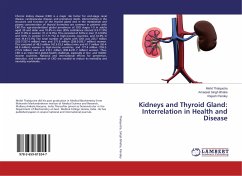Chronic kidney disease (CKD) is a major risk factor for end-stage renal disease, cardiovascular disease, and premature death. Abnormalities in the structure and function of the thyroid gland and in the metabolism and plasma concentration of thyroid hormones are common in patients with CKD.The age-standardized global prevalence of CKD stages 1-5 in adults aged 20 and older was 10.4% in men (95% confidence interval 9.3-11.9%) and 11.8% in women (11.2-12.6%). This consisted of 8.6% in men (7.3-9.8%) and 9.6% in women (7.7-11.1%) in high-income countries, and 10.6% in men (9.4-13.1%) The total number of adults with CKD was 225.7 million (205.7-257.4 million) men and 271.8 million (258.0-293.7 million) women. This consisted of 48.3 million (42.3-53.3 million) men and 61.7 million (50.4-69.9 million) women in high-income countries, and 177.4 million (159.2-215.9 million) men and 210.1 million (200.8-231.7 million) women. Thus, CKD is an important global-health challenge, especially in low- and middle-income countries. National and international efforts for prevention, detection, and treatment of CKD are needed to reduce its morbidity and mortality worldwide.
Bitte wählen Sie Ihr Anliegen aus.
Rechnungen
Retourenschein anfordern
Bestellstatus
Storno








